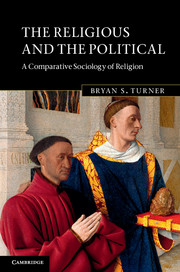13 - The state and freedom of religion
Published online by Cambridge University Press: 05 April 2013
Summary
Introduction: Erastian constitutions
Secularization can be defined in many different ways. Perhaps the most basic definition is simply the separation of church and state. For the sake of simplicity, I start with this minimal position. This separation – or, in the language of American constitutionalism, ‘the wall’ – between church and state is often seen to be the very foundation of modernity. Yet in so many societies, and with respect to numerous political issues, they are not separate. In this volume I have been concerned to describe a somewhat different approach to secularization that involves ‘Erastianism’, namely the shaping and control of religion by the state. Thomas Erastus was a Swiss-German theologian who criticized ecclesiastical power, especially the power of excommunication, and his theological views promoted the control of religion by a secular state. In some respects this volume can be regarded as a comparative study of Erastianism, which can be simply called, with reference to modern societies, ‘the management of religion’ by the state (Barbalet, Possamai and Turner, 2011). In particular, these chapters have drawn attention to the enduring influence of the Treaty of Westphalia in so far as the modern system of nation-states in Europe had its origin in the religious settlement of 1648 which brought to an end the disastrous wars that had followed the Reformation. Its treaty arrangements worked towards an international system of sovereign states, each with its own prince, separate religions and legal sovereignty. It also assumed that religious membership was conventional and a consequence of baptism rather than conversion. Princes were necessarily nervous about the implications of conversion, because such activity threatened the balance of religious membership within civil society. Religious ‘enthusiasm’ was seen to be disruptive. The world in which we live is very different from the Europe of the seventeenth century, but many of these issues remain in the tensions between state and church, problems of membership with respect to citizenship and religious identity, the unsettling effects of evangelical conversion, and the extent of the authority of the state over religion.
- Type
- Chapter
- Information
- The Religious and the PoliticalA Comparative Sociology of Religion, pp. 244 - 254Publisher: Cambridge University PressPrint publication year: 2013
- 1
- Cited by



